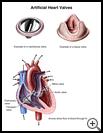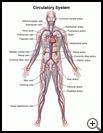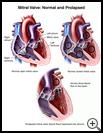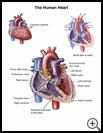
Heart Valve Disorders Discharge Information
What is a heart valve disorder?
The heart has four valves that work together to keep blood flowing in the right direction. They are the tricuspid, pulmonic, mitral, and aortic valves. They are made of thin tissue and open and close easily.
A heart valve disorder means that one or more of your heart valves does not work properly. It may either not open all the way or be unable to close completely. When a valve opening narrows (called stenosis), the valve does not open all the way, so the heart has to work harder to pump blood to the body. When a valve does not close completely between heartbeats, blood can move backward in the heart (called regurgitation). This means the heart must work harder to pump more blood than normal with each beat, which may put too much strain on your heart. A valve may not be working well because it is damaged by disease or because it was abnormal at birth.
Your valve may have been repaired, or replaced with tissue from a cow, pig, or donated human tissue (biological valve), or by man-made materials (mechanical valve).
How can I take care of myself when I go home?
How long it takes to get better depends on your treatment, how well you recover, your overall health, and any complications you may have. It is important to maintain good health to prevent further complications.
Management
- Your provider will give you a list of your medicines when you leave the hospital.
- Know your medicines. Know what they look like, how much you should take each time, how often you should take them, and why you take each one.
- Take your medicines exactly as your provider tells you to.
- Carry a list of your medicines in your wallet or purse. Include any nonprescription medicines and supplements on the list.
- Talk to your provider before you use any other medicines, including nonprescription medicines.
- Your provider may prescribe medicine to:
- Reduce fluid build-up and swelling in the body
- Prevent blood clots
- Reduce blood pressure, slow the heart rate, and reduce the workload of the heart
- Help your heart muscle beat stronger and regularly
- Treat or prevent an infection
- Replace minerals your body loses when taking certain medicines used to treat your condition
- Your provider may recommend other types of therapy to help relieve pain, other symptoms, or side effects of treatment.
- If you have had surgery, to care for your surgical wound:
- Keep your surgical wound clean.
- If you are told to change the dressing on your surgical wound, wash your hands before changing the dressing and after disposing of the dressing.
Appointments
- Follow your provider's instructions for follow-up appointments.
- Keep appointments for any testing you may need.
Talk with your provider about any questions or concerns you have.
Diet, Exercise, and Other Lifestyle Changes
- Follow the treatment plan your provider prescribes.
- You may need to make changes in some of the foods you eat. Ask your provider about the benefits of talking to a dietician to learn what you need in a healthy diet.
- Ask your healthcare provider if there are any foods or medicines you should avoid.
- Drink enough fluids to keep your urine light yellow in color, unless you are told to limit fluids.
- Don't smoke.
- Lose weight if you need to and keep a healthy weight.
- If you have high blood pressure, make sure your blood pressure is under control.
- Find ways to make your life less stressful.
- Exercise as your provider recommends.
- Tell all your other healthcare providers about your heart valve problem.
Call emergency medical services or 911 if you have new or worsening:
- Chest pain or pressure, squeezing, or fullness in the center of your chest that lasts more than a few minutes, or goes away and comes back (may feel like indigestion or heartburn)
- Pain or discomfort in one or both arms or shoulders, or in your back, neck, jaw, or stomach
- Trouble breathing
- Breaking out in a cold sweat for no known reason
- Along with the previous symptoms, feeling very tired, faint, or sick to your stomach
If you have any of these symptoms, do not drive yourself.
Call your healthcare provider if you have new or worsening:
- Fever higher than 101.5° F (38.6° C)
- Feeling like your heart is beating too fast, too slow, or skipping beats
- Sudden weight gain of 3 pounds in one day or 5 pounds in a week
- Swelling in your feet, ankles, or legs, or abdominal bloating, or swollen hands or face
- Chest discomfort when lying down
- Fainting
- Signs of infection around your surgical wound if you had surgery. These include:
- The area around your wound is more red or painful
- Your wound area is very warm to touch
- You have blood, pus, or other fluid coming from the wound area
- You have chills or muscle aches
Ask your healthcare provider about any medicine, treatment, or information that you do not understand.
Last modified: 2016-05-17
Last reviewed: 2016-05-16




